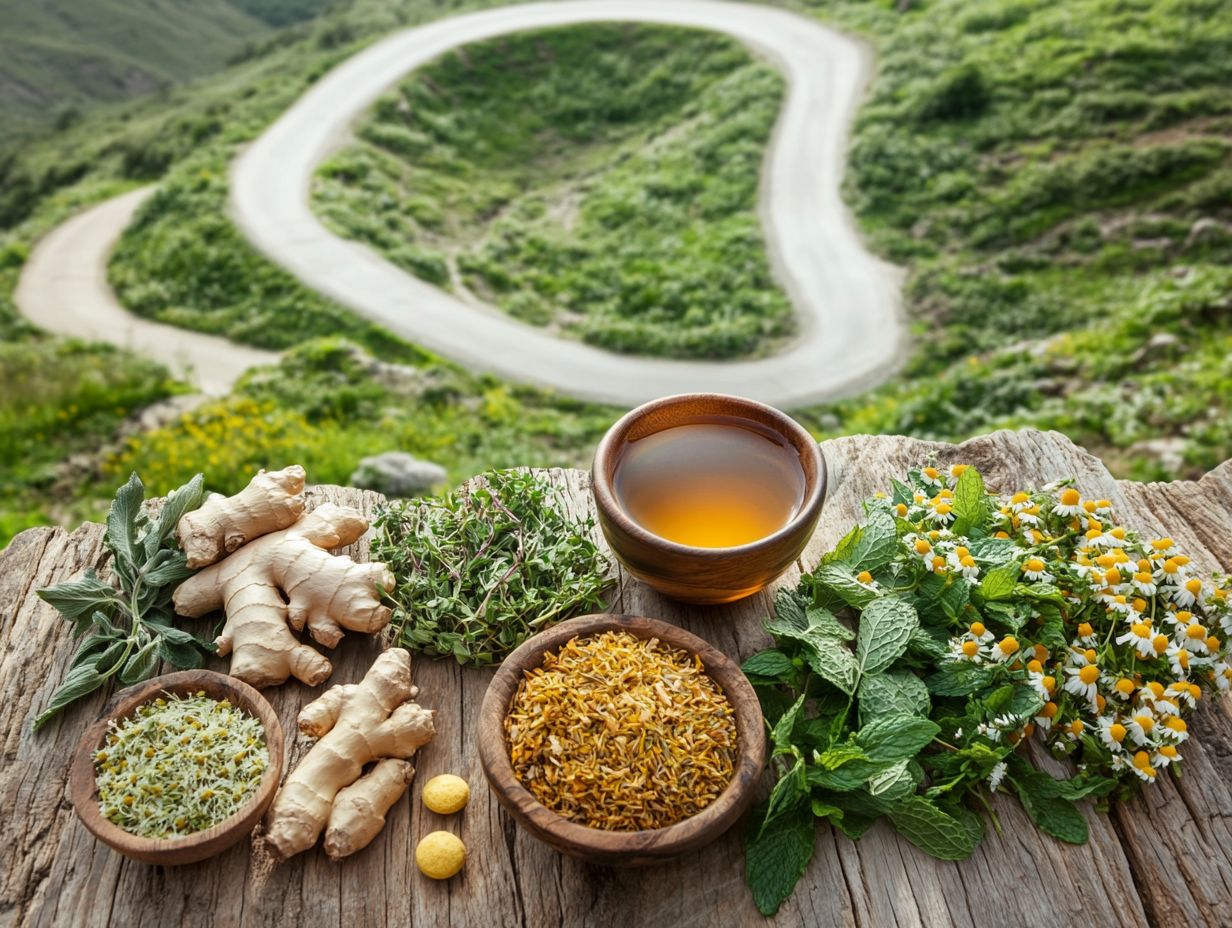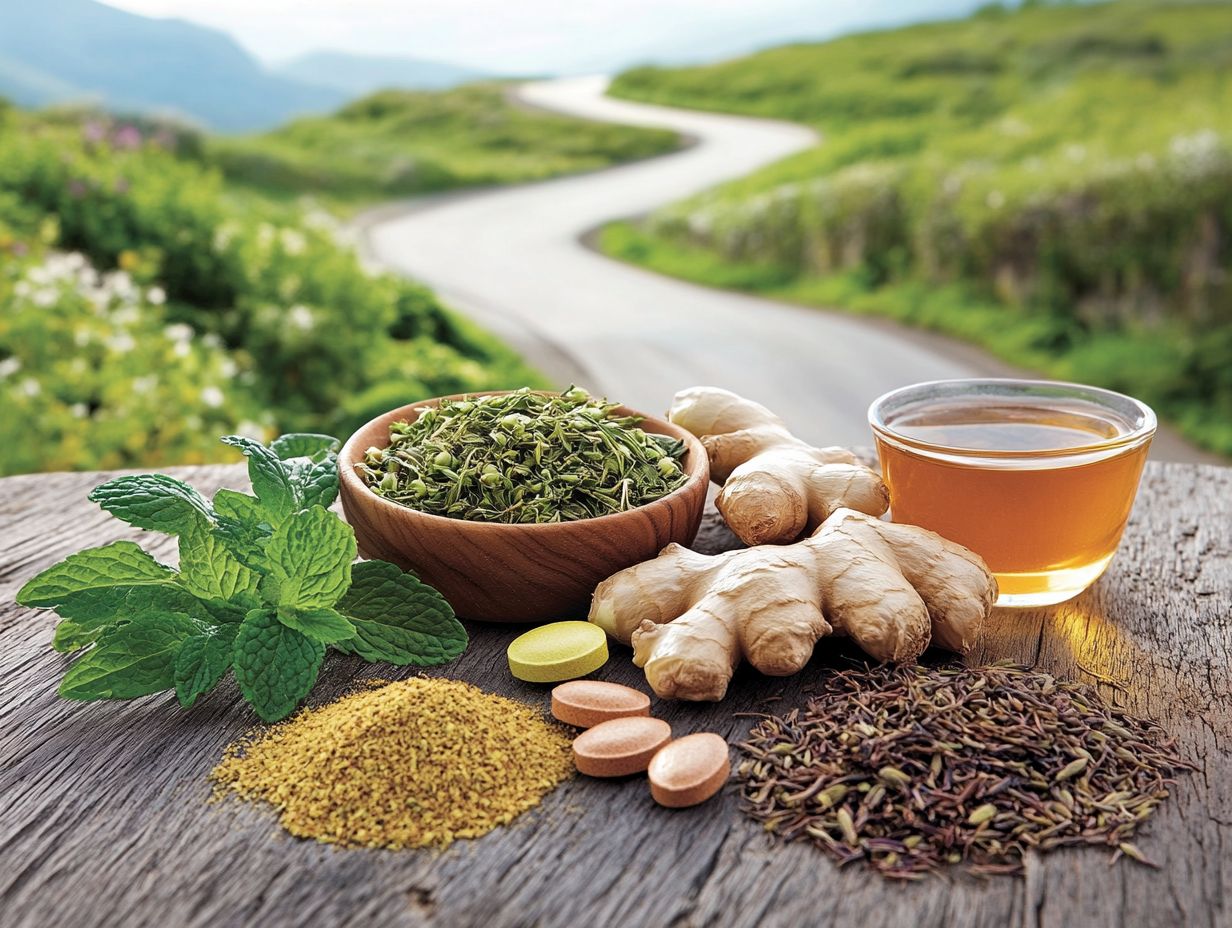Herbal Remedies for Travel Sickness
Travel sickness can certainly cast a shadow over even the most thrilling adventures, leaving you feeling uneasy and out of sorts.
Understanding this condition is your first step toward finding relief. This article delves into common symptoms, explores traditional herbal remedies, and examines their safety and effectiveness. It also provides practical tips on how to seamlessly integrate these natural solutions into your travel routine.
Whether you re a frequent flyer or a road trip aficionado, you ll uncover ways to savor your journey without the unwelcome side effects.
Contents
- Key Takeaways:
- Overview of Travel Sickness
- Common Symptoms of Travel Sickness
- Traditional Herbal Remedies for Travel Sickness
- Popular Herbal Remedies and Their Uses
- Safety and Effectiveness of Herbal Remedies
- Potential Risks and Benefits
- Incorporating Herbal Remedies into Your Travel Routine
- Tips for Using Herbal Remedies Effectively
- Alternative Remedies for Travel Sickness
- Frequently Asked Questions
- What are herbal remedies for travel sickness?
- What are some examples of herbal remedies for travel sickness?
- How do herbal remedies for travel sickness work?
- Are herbal remedies for travel sickness safe to use?
- Are there any side effects of using herbal remedies for travel sickness?
- Can herbal remedies for travel sickness be used for children?
Key Takeaways:
Herbal remedies can be a safe and effective option for managing travel sickness symptoms.
Popular herbal remedies include ginger, peppermint, and chamomile.
Incorporating these remedies into your travel routine can help alleviate symptoms and make your journey more enjoyable.
Overview of Travel Sickness
Travel sickness, commonly known as motion sickness, can strike when you’re on the move be it on a plane, in a car, or aboard a boat. Symptoms include dizziness, sweating, nausea, and vomiting. These can put a serious damper on your travel experience.
The CDC highlights the importance of understanding the causes and symptoms to manage this condition effectively. Fortunately, several travel tips can help alleviate discomfort, allowing you to enjoy a much more pleasant journey.
Understanding the Condition
Understanding motion sickness is vital for managing its symptoms and enhancing your travel experiences. This condition affects how your body processes motion data, which refers to the signals your body receives about movement.
When you re in motion, your inner ear, eyes, and sensory systems send conflicting signals to your brain. For example, your eyes might see a stationary horizon while your inner ear detects movement, creating a sensory conflict that feels disorienting.
To alleviate these symptoms, experts recommend various strategies. One effective method is acupressure, where you press certain points on your body to feel better. Cognitive-behavioral therapy can also help by changing negative thoughts about travel, easing your mind and potentially reducing your physiological responses to motion.
Common Symptoms of Travel Sickness
Common symptoms present a host of uncomfortable sensations that can derail your travel plans. Nausea is often the most frequently reported issue among travelers.
Identifying and Managing Symptoms
Identifying symptoms starts with recognizing early warning signs and applying effective strategies to alleviate discomfort. You might notice dizziness, nausea, or cold sweats creeping in. Acknowledging them early increases your chances for effective intervention.
Staying hydrated is crucial. It helps maintain your body s balance and can significantly reduce feelings of sickness. Avoiding greasy or heavy meals before and during your travels can keep gastric distress at bay.
Along with these preventive measures, consider techniques like diaphragmatic breathing to promote relaxation and ease anxiety. Engaging in light physical activities, such as stretching or walking, can stimulate blood circulation and alleviate discomfort. For extra relief, acupressure wristbands can provide gentle stimulation to help reduce nausea.
Traditional Herbal Remedies for Travel Sickness

Traditional herbal remedies have a long-standing reputation for alleviating symptoms of travel sickness. Ginger root is particularly noted for its ability to reduce nausea and vomiting.
You won’t believe the relief these remedies can provide! Consider trying them on your next journey for a more enjoyable travel experience.
In summary, herbal remedies can effectively combat travel sickness, ensuring you enjoy your trips without discomfort. So pack those remedies and travel worry-free!
Popular Herbal Remedies and Their Uses
Popular herbal remedies for travel sickness, such as ginger tea and peppermint oil, are renowned for their natural properties that effectively alleviate nausea.
Many travelers discover that a steaming cup of ginger tea offers instant relief during long journeys. It s made by steeping fresh ginger slices in hot water for about 10 minutes.
Peppermint oil works wonders too! When diluted with a carrier oil and applied to your temples or wrists, it enhances calming effects and reduces feelings of dizziness.
These remedies work well with acupressure bands, which target specific pressure points to ease motion-induced discomfort. By combining these herbal solutions with acupressure, you can create a complete plan to tackle travel sickness, ensuring a smoother, more enjoyable journey ahead.
Safety and Effectiveness of Herbal Remedies
When considering herbal remedies for travel sickness, it s essential to assess their safety and effectiveness, especially regarding traditional over-the-counter medications and potential interactions with blood-thinning treatments.
Your well-being depends on making informed choices that prioritize both efficacy and safety.
Potential Risks and Benefits
Are you weighing the risks and benefits of herbal remedies for travel sickness? It s crucial to carefully consider them while consulting a healthcare provider for tailored advice.
You may find the allure of natural solutions quite tempting, believing that herbal options are inherently safer than pharmaceuticals. This viewpoint can lead to missteps if not approached with discernment.
Herbal remedies can interact with prescription medications or exacerbate existing health conditions, potentially creating unintended consequences that jeopardize your well-being.
That s why engaging with a healthcare professional is essential! Their expertise can provide valuable guidance, helping you navigate the complexities of these natural alternatives.
By taking this step, you can ensure that your decisions are informed and balanced, ultimately fostering a more holistic approach to your health.
Incorporating Herbal Remedies into Your Travel Routine
Incorporating herbal remedies into your travel routine can serve as a proactive approach to preventing travel sickness, particularly when thoughtfully integrated into your plans well before your departure.
Tips for Using Herbal Remedies Effectively

To effectively use herbal remedies for travel sickness, you need to understand the proper application of ingredients like ginger, along with the advantages of acupressure wristbands and essential oils.
When incorporating these remedies, be meticulous about dosages and timing. For example, start consuming ginger whether in tea or capsule form about an hour before your travel, with a recommended dosage of 1-2 grams.
Don t forget about acupressure wristbands! Wearing them on both wrists stimulates pressure points. Putting them on before your journey can help ward off symptoms even before they appear.
As for essential oils, inhaling peppermint or lavender scents through a diffuser or applying diluted oils to your pressure points can offer much-needed relief when necessary. Regularly using these methods not only alleviates discomfort during travel but also acts as a proactive measure, preparing your body for the adventure ahead.
Alternative Remedies for Travel Sickness
Alternative remedies for travel sickness offer a range of options for alleviating symptoms. You may find strategies like avoiding reading during transit and employing relaxation techniques increasingly popular among fellow travelers seeking relief.
Talk to your doctor to find out which remedies are best for you!
Other Natural Methods for Managing Symptoms
Other natural methods for managing travel sickness symptoms include cognitive-behavioral therapy and the use of sea bands, both of which provide effective natural relief.
These strategies are great for anyone seeking alternatives to medication. Cognitive-behavioral therapy empowers you to change your thoughts. This can significantly reduce anxiety during travel.
Sea bands apply gentle pressure to your wrist, which can help relieve nausea.
When combined with herbal remedies like ginger or peppermint, these techniques create a robust strategy for tackling motion sickness. Combining psychological strategies with natural solutions can boost your comfort and make traveling a joy!
Frequently Asked Questions
What are herbal remedies for travel sickness?
Herbal remedies for travel sickness are natural treatments that can help alleviate symptoms of motion sickness, such as nausea, dizziness, and vomiting while traveling.
What are some examples of herbal remedies for travel sickness?
Some common herbal remedies for travel sickness include ginger, peppermint, lemon balm, and chamomile. These herbs can be consumed in various forms such as teas, capsules, or essential oils.
How do herbal remedies for travel sickness work?
Herbal remedies for travel sickness work by targeting the digestive system and the central nervous system to help reduce symptoms of motion sickness. They can also have anti-inflammatory and calming effects on the body.
Are herbal remedies for travel sickness safe to use?
Yes, herbal remedies for travel sickness are generally safe to use. However, it is important to consult with a healthcare professional before starting any new herbal regimen, especially if you have any pre-existing medical conditions or are taking medication.
Are there any side effects of using herbal remedies for travel sickness?
While herbal remedies for travel sickness are considered safe, some people may experience mild side effects such as stomach upset, heartburn, or allergic reactions. It is important to follow recommended dosages and to stop use if any adverse reactions occur.
Can herbal remedies for travel sickness be used for children?
Some herbal remedies for travel sickness, such as ginger, can be used for children as well. However, it is important to consult with a pediatrician before giving any herbal remedies to children and to use age-appropriate dosages.






